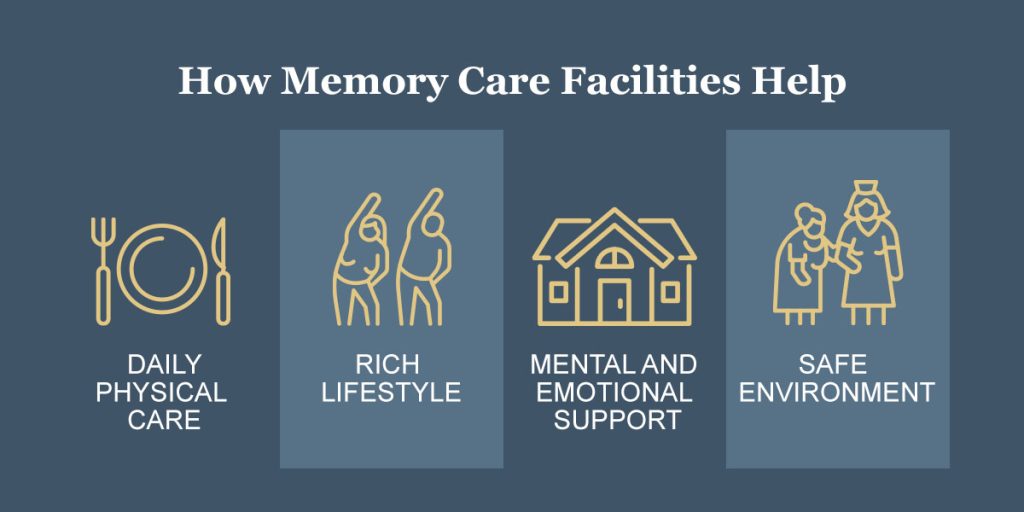
It’s completely normal for your loved ones to experience some memory changes as they age, such as struggling to recall information quickly or occasionally misplacing things. In fact, the Alzheimer’s Association estimates that around one in 10 individuals aged 45 and older experience subjective cognitive decline that causes confusion and memory loss. However, these early signs can progress into more serious memory challenges that make it difficult for your family members to complete daily tasks.
While many older adults with memory impairments can live independently for a while, those with advanced Alzheimer’s disease or another form of dementia often need specialized care from trained professionals. If you’re concerned about your loved one’s safety, worsening symptoms or ability to care for themselves, you may be considering finding a high-quality memory care facility. We understand that this can be a conflicting, emotional process, so we’re here to help you determine when memory care is needed.
Contents:
Self-care difficulties in individuals with dementia vary from person to person. If a doctor hasn’t specified that your loved one should move to a specialized memory support facility, how do you know when it’s time for memory care? Here are a few signs that indicate your family member may benefit from moving to a memory care facility.
Staying hydrated and nourished is of necessary for all individuals, especially older adults with a medical condition or illness. Have you noticed unusual lethargy or weight loss in your loved one? This may be a result of forgetting to eat or skipping meals. Likewise, spilling drinks or choking on food is a strong indication that they require daily support.
If your loved one struggles to maintain good hygiene, it may be time to consider a memory care facility. They might have trouble bathing, showering and brushing their teeth, or they might experience incontinence of the bladder and bowels. Incontinence may be a result of:
Aside from eating, drinking and maintaining hygiene, you will know if your loved one needs memory care if they have trouble maintaining a healthy living environment for themselves or performing activities of daily living (ADLs). These can include the following:
One of the most notable symptoms of memory decline is changes in your loved one’s behavior. A parent who was once a social butterfly may become very withdrawn and unable to hold a relevant conversation. A sibling might display signs of confusion about where they are or who they are.
They might be disoriented and struggle to remember where they have been and what they were doing. It’s not uncommon for a person living with a memory disorder to become frustrated, anxious or irritated when they can’t recall something.
Severe cognitive decline can cause your loved one to lose their ability to recognize familiar places, which can result in confusion about their location. Many people with cognitive decline tend to wander aimlessly, which can be dangerous and even life-threatening.
If your loved one frequently wanders or gets lost when they leave the house, it can be very stressful to ensure their safety and well-being. These unpredictable behaviors can indicate it is time for memory care. People with dementia may also trip and fall more often, leading to fractures and other injuries.
Being a caregiver for a loved one is intrinsically rewarding, but it can also take a heavy physical and mental toll. Informal caregivers of older adults with memory conditions can experience significant emotional strain, distress and a lack of support. Additionally, some advanced memory conditions can cause individuals to become violent or aggressive, which can put you at risk.
Caring for your loved one is some of the most important work you’ll ever do, but it’s just as necessary to prioritize your own needs and mental health. If you’re feeling burnt out, moving your loved one to a memory care facility can give you peace of mind that they’re being cared for by compassionate, skilled professionals.
It’s understandable to want to keep your family member in a familiar environment, but if you’re unable to provide the specific care they need, it’s likely a good time for transitional memory care.

People living with dementia or other forms of memory loss have unique needs that sometimes require daily support. We’ve outlined some of the top benefits so you’ll know what to expect from a memory care facility:
Even though your loved one’s well-being is your top priority, talking to them about transitioning to memory care can be intimidating. Keep in mind that individuals with memory issues can quickly become overwhelmed. Try to approach the subject of this new chapter sensitively and offer plenty of encouragement. Clearly communicate the upcoming changes with concise verbiage, such as “This is a place where you’ll be safe.”
Try to avoid involving them too much with the details of the move, like packing and planning, as this can cause additional stress. It’s important to keep your loved one focused on the positive benefits of their new home, such as companionship and fun activities.
It’s also a good idea to familiarize yourself with their memory care community to reassure them if they become anxious. Most importantly, you’ll want to choose a high-quality memory care facility for your loved one’s unique situation.

We recognize that watching your family member struggle with memory challenges can be distressing, especially if you aren’t sure of the next steps. We encourage you to find the support your loved one deserves with the help of experienced memory care professionals at Elm Terrace.
We’re committed to providing exceptional daily care and a high quality of life for each resident by addressing their individual needs. It’s our goal to support your loved ones as they transition to our memory care facility. If you think Elm Terrace could be a good fit for your loved one, we encourage you to contact us online or schedule a free lunch and tour.